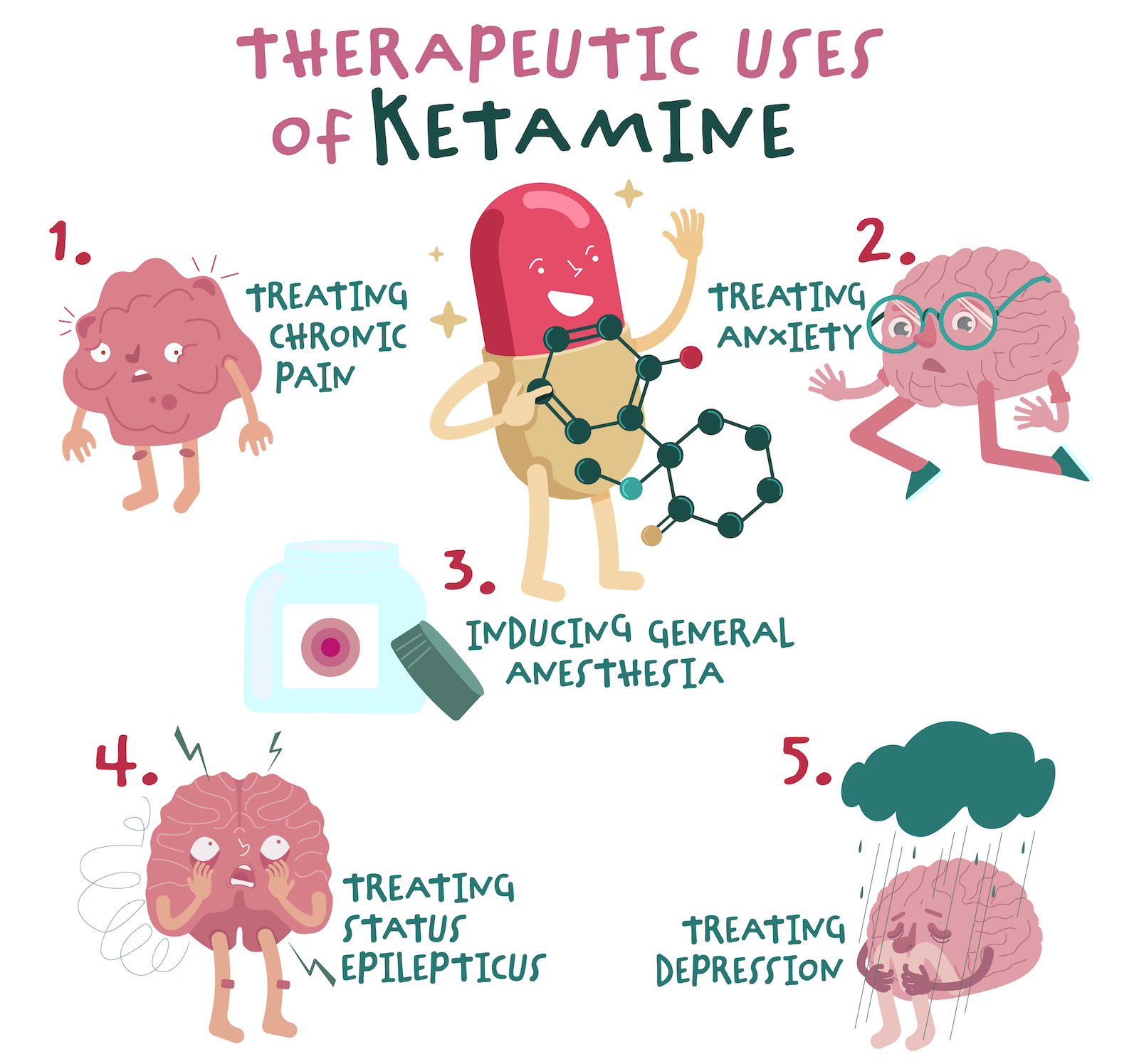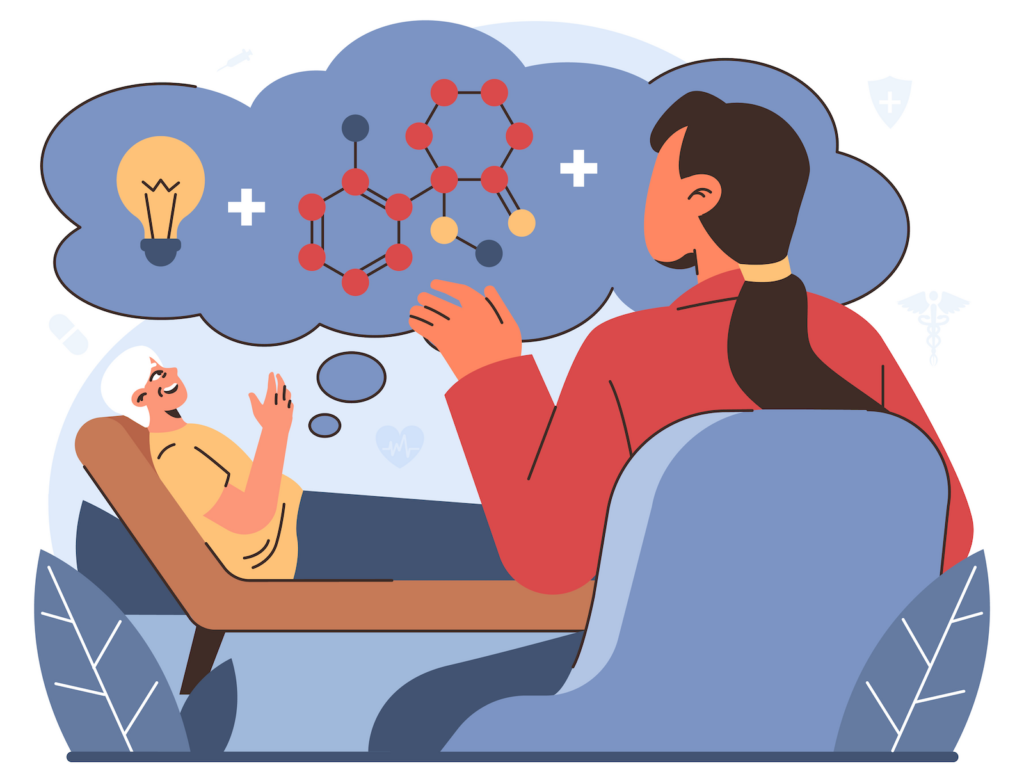If you’ve been searching for “ketamine psychotherapy near me,” you’re in the right place! Today, we’re diving into a fascinating intersection of neuroscience, psychology, and medicine—a topic that’s as intriguing as it is vital in understanding the future of mental health treatment. The spotlight of our discussion is ketamine psychotherapy. This innovative approach is not just about the substance itself, but how it’s integrated with psychotherapeutic techniques to treat various mental health conditions.
Ketamine, originally known for its use as an anesthetic, has emerged in recent years as a potential game-changer in treating depression, PTSD, and other mental health disorders, especially where traditional treatments have failed.
Ketamine psychotherapy combines the pharmacological effects of ketamine—such as its ability to create new neural connections and provide relief from depressive symptoms—with guided psychotherapy sessions. This combination aims to leverage the altered states of consciousness and increased neuroplasticity brought about by ketamine to smooth the way for deeper therapeutic insights and lasting change.
The Science Behind Ketamine
Back in the 1960s, a chemist named Calvin Stevens discovered ketamine, which works differently from most antidepressants you might have heard about. Instead of taking the usual route, ketamine targets a specific part of the brain that’s crucial for learning and memory, known as the N-methyl-D-aspartate (NMDA) receptor. By interacting with these receptors, ketamine can quickly lift someone’s mood, often in just a few hours after it’s taken.
This quick action is a big deal, especially for people who haven’t had much luck with the standard antidepressants, which can take several weeks to start working. Imagine feeling significantly better so soon after trying something new, when nothing else seemed to help—that’s what makes ketamine stand out in the world of mental health treatments.
The Psychotherapy Component: What Is Ketamine Psychotherapy?
Now that we know how ketamine itself works, let’s talk about the psychotherapy part of this topic. Imagine combining the effects of ketamine with talking therapy sessions—this combo is what happens at a ketamine psychotherapy treatment center like ours. It’s like pairing a key that can unlock new pathways in your brain with a guide who helps you navigate these new paths.

How Ketamine Psychotherapy Works
The first step is always going to be a consultation with a qualified mental health professional and a medical doctor. This evaluation is to help make sure that ketamine is a suitable option for the client’s specific condition and medical history.
Then, a doctor will administer the ketamine in a controlled setting, which can make the brain more open to change and new ways of thinking for a short period. Then, while these effects are kicking in, the person works with a therapist in a session to explore thoughts, feelings, and behaviors in ways that might have been too tough or scary to tackle before.
The idea is that ketamine opens up the brain’s ability to learn and adapt, making it more receptive to therapy. This can be helpful for people dealing with tough-to-treat depression or other mental health issues that haven’t improved with traditional treatments. By taking advantage of the brain’s heightened state of plasticity (basically, its ability to change), patients can achieve insights or make progress that might take much longer to reach with psychotherapy alone.
In summary, ketamine psychotherapy is like a dynamic duo—ketamine sets the stage by making the brain more malleable, and then psychotherapy steps in to guide the person towards healing. It’s a cutting-edge approach that’s opening up new possibilities for treating mental health conditions.
What is Ketamine Psychotherapy Used For?
Ketamine psychotherapy is emerging as a powerful ally in the battle against some of mental health’s toughest opponents, especially when traditional therapies haven’t made the cut. It’s like bringing in the special forces when the regular troops need backup. Here’s where ketamine psychotherapy shines:
Treatment-Resistant Depression
Not just the bad days we all face, but the deep, persistent gloom that doesn’t budge with standard antidepressants or therapy. Ketamine is believed to provide rapid relief for major depression, especially when other medications have failed, making it a critical option for urgent symptom management.
Anxiety Disorders
Beyond everyday worries, we’re talking about a relentless state of tension and fear that overwhelms. Ketamine can help dial down this anxiety to more manageable levels, providing relief where other treatments may fall short.
Post-Traumatic Stress Disorder (PTSD)
For those haunted by past traumas, reliving them in nightmares or sudden flashbacks, ketamine psychotherapy can be a game-changer. It offers a chance to ease those symptoms, making the trauma more approachable for therapeutic work.
Obsessive-Compulsive Disorder (OCD)
This involves intrusive, obsessive thoughts and repetitive, compulsive actions. Ketamine’s effect can reduce the grip of these symptoms, opening a door to more effective therapeutic interventions.
Chronic Pain
Imagine living with pain that just doesn’t go away, a kind that’s always there, affecting every part of your life. Chronic pain can be both physically debilitating and psychologically draining. Ketamine psychotherapy comes into play by altering the way the brain processes pain signals, offering relief where other treatments may have failed. It’s like resetting the brain’s pain response, providing a chance for patients to engage in physical therapy and rehabilitation with less discomfort.
End-of-Life Anxiety
Facing the end of one’s life can bring about profound anxiety and existential distress. For individuals in palliative care, ketamine psychotherapy can offer a sense of peace and alleviate the fear of dying. By inducing a state where patients may experience a sense of detachment from their immediate concerns and a deeper connection with their inner selves, ketamine can help individuals reconcile with their life’s journey and find comfort during their final days.
These applications demonstrate the broad potential of ketamine psychotherapy as a versatile treatment option across a spectrum of challenging conditions.

Who Is a Good Candidate for Ketamine Psychotherapy?
When we talk about ketamine psychotherapy, it’s not a one-size-fits-all kind of deal. It’s more like a specialized tool that can be incredibly effective for certain people under the right circumstances. So, who stands to benefit the most from this approach?
Those Who Haven’t Found Relief Elsewhere: If someone has tried various antidepressants or different types of therapy without much improvement, especially in cases of severe depression or anxiety, ketamine psychotherapy might offer them a new path forward. It’s particularly aimed at those who feel stuck or who haven’t seen significant changes with conventional treatments.
Individuals Experiencing Severe Symptoms: People dealing with intense symptoms of depression, anxiety, PTSD, or suicidal thoughts, where these feelings significantly impact their ability to function daily, may find rapid relief through ketamine therapy. It’s like a fast-acting lifeline for those in acute distress.
Patients with Chronic Pain or End-of-Life Anxiety: For those grappling with persistent pain that’s resistant to other treatments or individuals facing profound existential anxiety as they approach the end of life, ketamine psychotherapy can provide significant symptom relief and a better quality of life.
People Open to Psychotherapeutic Work: Because this therapy combines ketamine’s biochemical effects with psychotherapy, candidates should be willing and able to engage in the therapeutic process. It’s not just about the drug; it’s about using the state it induces to work through problems with a therapist’s guidance.
However, it’s important to note that this treatment isn’t for everyone. People with certain health conditions, like uncontrolled high blood pressure or a history of psychosis, might need to explore other options. Plus, because the therapy involves entering altered states of consciousness, it requires a safe, controlled environment and a professional who can guide the process effectively.
Is Ketamine Psychotherapy Safe?
When administered and supervised by trained professionals in a controlled setting, it’s considered safe for many individuals. Our team provides a thorough screening process to identify suitable candidates and exclude those with conditions that might increase the likelihood of adverse reactions. Additionally, the therapeutic setting and professional guidance during the treatment play crucial roles in its safety and effectiveness.
How Fast Can I Expect to See Results From Ketamine Psychotherapy?
One of the most impressive things about this treatment is how quickly it can start to make a difference for some people. Unlike traditional antidepressants, which can take several weeks or even months to kick in, ketamine can show results much faster—sometimes within just a few hours or days after the first treatment. Imagine going to bed feeling one way and waking up the next day starting to see the world a little differently; that’s the potential speed we’re talking about here.
However, it’s important to keep in mind that everyone’s experience with ketamine psychotherapy is unique. While some might feel an immediate improvement in their mood or a decrease in symptoms of depression, anxiety, or other conditions, others may need a few sessions before they start noticing significant changes. Also, the quick relief it can provide doesn’t mean it’s a permanent fix on its own.
It’s often part of a broader treatment plan that includes ongoing therapy and possibly other medications to help maintain and build on the initial improvements. So, if ketamine psychotherapy sounds like a miracle quick-fix, remember it’s actually a starting point for deeper, lasting change, supported by professional guidance and personal commitment to the healing process.
Ready to Find Out if Ketamine Psychotherapy Is Right for You?
As research continues to evolve, ketamine therapy promises not only immediate relief but also profound transformative experiences for those who have struggled with conventional treatments. If you are considering this innovative therapy, we invite you to contact us. Our team can offer further guidance about ketamine therapy in San Diego and determine if ketamine psychotherapy is the right choice for you.

